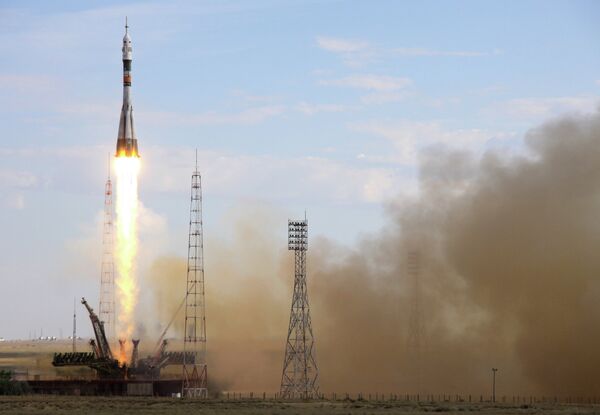MOSCOW, August 23 (RIA Novosti) - NASA has announced that the US is currently close to completing development of its new commercial space taxi, which is designed to transport American astronauts to the International Space Station, replacing Russia's Soyuz carriers.
"The multibillion-dollar program has taken on new urgency in recent months, given escalating tensions with Russia," Reuters notes.
According to Reuters, Boeing has a competitive advantage over its four American rivals as it is the only manufacturer which was able to accomplish the NASA task on time, meeting all of the required "success criteria." One or more of the competitors will continue to collaborate with NASA until late August or early September, the US space agency noted.
John Mulholland, Boeing's vice president and program manager for space exploration programs, claimed that the design of the company's cargo and crew modules was almost complete. "To the best of my knowledge, we’re the only CCiCAP competitor that actually was able to complete all of the milestones in the period of performance," he said, as cited by Reuters.
It should be noted that the project to replace Russian Soyuz transport vehicles with reusable American ones started long before tensions arose between Moscow and Washington. In September, 2013, Air&Space Magazine reported that NASA had paid about $600 million to Boeing to design the CST-100, a new space capsule for human transportation.
"Designing the CST-100 [will become] the aerospace giant's entrant in NASA's competition for a privately built successor to the shuttle that will carry crews to the International Space Station on US-built hardware, rather than the Russian Soyuz capsule NASA has been relying on since the shuttle retired," the magazine explained, adding that a prototype of the CST-100 was expected to be completed by the end of 2014.
NASA's new space module project was initiated by Barack Obama in 2010. The Commercial Crew Program (CCP) was established in order to empower the US to transport people to space, "with the goal of achieving safe, reliable and cost-effective access to and from the International Space Station and low Earth orbit," a statement on NASA's official website reads.
However, the US sanctions imposed on Russia catalyzed the American space module’s development. Although the production of the capsule has not yet begun, experts claim that the new module would become the only alternative to Soyuz, since NASA has suspended its collaboration with Roscosmos, Russia’s federal space agency. Reportedly, Boeing's CST-100 will be launched by an Atlas 5 rocket. It's worth mentioning that the carrier rocket also uses a Russian-made RD-180 engine. Thus, the American specialists are expressing growing concerns regarding America’s policy of sanctions against Russia. It seems that the space exploration projects are at risk due to the ambitions of US policy-makers, experts stress.

